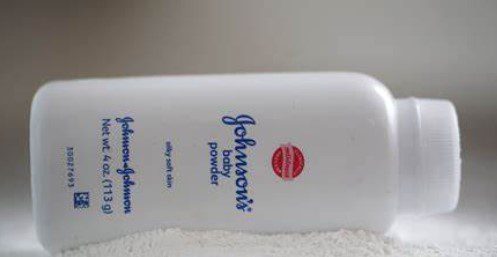Johnson & Johnson Hit With $966 Million Verdict in Talc Cancer Case
On October 6, a Los Angeles jury awarded $966 million to the family of a woman who claimed that her mesothelioma was caused by asbestos-contaminated talc products manufactured by pharmaceutical giant, Johnson & Johnson; Mae Moore was a California resident who died of the rare cancer in 2021, a year after she filed suit against the company. The jury allocated $16 million in compensatory damages and an additional $950 million in punitive damages. Although Ms. Moore filed her lawsuit in 2021, J&J’s repeated efforts to achieve a bankruptcy settlement that would include the thousands of pending claims filed against it delayed the proceedings.
In its findings, the jury determined that J&J had concealed the risks inherent in using its baby powder products which was a main factor in causing the plaintiff’s mesothelioma; the jury also agreed that J&J acted with malice by failing to protect the users of its product. In her complaint, Ms. Moore pointed out that J&J has been testing its talc products for impurities since the 1950s, and that a number of those tests revealed that the products were contaminated by asbestos.
In response to the outsized verdict, Erik Haas, J&J’s litigation chief stated:
“We will immediately appeal this egregious and unconstitutional verdict that is directly at odds—in result and amount—with the vast majority of other talc cases wherein the Company has prevailed, including the defense verdict last week against the same plaintiff law firm that brought this baseless action.”
The company further argued that the case brought by Ms. Moore was based on “junk science” that never should have been presented to the jury.
For a number of years, J&J has maintained that its baby powder does not contain asbestos or cause cancer. Notwithstanding their position, the company stopped selling talc-based baby powder in 2020, switching instead to cornstarch-based products.
The most recent verdict may be reduced on appeal since the U.S. Supreme Court has ruled that punitive damages should, as a rule, be no more than nine times any compensatory award.
Going forward, in the wake of the dismissal of J&J’s third attempt to resolve nearly 90,000 talcum powder lawsuits through a Chapter 11 settlement worth $9 billion, the company decided to return to the tort system and try cases on an individual basis where results have been mixed. J&J has won 16 out of the last 17 cases that went to trial but losses have been significant; including a $4.7 billion award to 22 women suffering from ovarian cancer in 2018 that was reduced by the appeals court to $2.1 billion.
The litigation surrounding Johnson & Johnson’s (J&J) talc-based products, primarily Baby Powder, represents one of the most significant and protracted mass tort cases in recent history. Allegations that these products caused ovarian cancer and mesothelioma due to asbestos contamination have led to tens of thousands of lawsuits, including a recent $8 million verdict in Massachusetts in June 2025 for a woman who alleged mesothelioma caused by J&J’s talc products. This ongoing legal battle has seen a mix of high-stakes jury trials, substantial verdicts, controversial bankruptcy strategies, and ongoing legal complexities. This article provides a comprehensive history of the J&J talc litigation, tracing its key developments, legal maneuvers, and the challenges faced by both the company and the claimants.
For insights into effective case management strategies applicable to complex litigations like this, see our article on Complex Case Management Lessons from the J&J Talc Litigation.
Baby Powder and Cancer: The Foundation of the J&J Lawsuits
The foundation of the J&J talc litigation lies in allegations that the company’s talc-based products, most notably Baby Powder and Shower to Shower, contained asbestos fibers. Plaintiffs contend that decades of use of these products led to the development of serious cancers, including ovarian cancer in women and mesothelioma, a rare cancer usually linked to asbestos exposure. These claims often cite internal documents allegedly showing that J&J was aware of potential contamination as early as the 1970s but failed to warn consumers. The scientific basis for these claims has been a central point of contention throughout the litigation, with plaintiffs presenting expert testimony linking talc and asbestos to cancer, while J&J has consistently argued that its products were safe and that the plaintiffs’ scientific evidence is flawed.

Early Legal Wins Against J&J Drive Further Talc Lawsuits
The talc litigation gained significant public attention with early jury verdicts against J&J. One notable case was the landmark 2018 verdict in St. Louis, Missouri, where a jury initially awarded $4.69 billion to 22 women who claimed J&J’s talc products caused their ovarian cancer. While this verdict was later reduced on appeal to $2.12 billion, it signaled a potential turning point and prompted thousands more plaintiffs to come forward. These early trials often involved the presentation of internal J&J documents and expert testimony regarding the presence of asbestos in talc and its potential carcinogenic effects. However, J&J also secured defense verdicts in some early cases, highlighting the ongoing battle over scientific evidence and causation.
As the J&J talc litigation progresses and potential settlements arise, efficient and expert settlement administration becomes crucial. Verus offers comprehensive services to manage all aspects of settlement processes, ensuring accuracy, fairness, and timely distribution of funds.
“Texas Two-Step”: A Controversial J&J Bankruptcy Strategy
Faced with mounting liabilities from the tens of thousands of pending lawsuits, Johnson & Johnson implemented a controversial legal maneuver known as the “Texas two-step.” This strategy involved creating a new subsidiary, LTL Management LLC, in Texas, to which J&J transferred all of its talc-related liabilities. Subsequently, LTL Management filed for Chapter 11 bankruptcy in North Carolina, a venue initially perceived as more favorable for such proceedings. The aim of this strategy was to consolidate the numerous claims and potentially resolve them more efficiently through a bankruptcy trust, offering a pathway to settle the massive litigation.
Legal Challenges and Setbacks for J&J’s Bankruptcy Efforts
J&J’s “Texas two-step” strategy has faced significant legal challenges. The bankruptcy filings of LTL Management in New Jersey (after a change of venue) were twice dismissed by U.S. Bankruptcy Judge Michael Kaplan, a decision upheld by the Third Circuit Court of Appeals. The primary reason for these dismissals was the court’s finding that LTL was not in genuine “financial distress,” a key requirement for a good faith bankruptcy filing. The court emphasized J&J’s financial strength and its commitment to funding LTL’s obligations. These dismissals were viewed as significant setbacks for J&J’s strategy to resolve the talc litigation through bankruptcy.
Update: Federal Judge Allows Plaintiffs to Add J&J Affiliates as Defendants in Talc MDL, Potentially Hindering Future Bankruptcy Efforts
According to Law.com, U.S. District Judge Michael A. Shipp has rejected Johnson & Johnson’s bid to block plaintiffs from adding three affiliated companies—Kenvue Inc., Janssen Pharmaceuticals Inc., and Johnson & Johnson Holdco Inc.—as defendants in the federal talc multidistrict litigation (MDL) currently pending in New Jersey, which involves more than 65,000 lawsuits alleging its baby powder caused ovarian cancer. The ruling affirms a special master’s 2024 decision that plaintiffs had plausibly alleged that these companies acquired assets, continued operations, and effectively served as a “new hat” for Johnson & Johnson’s former consumer unit that made the powder.
The decision could significantly limit J&J’s ability to pursue another talc bankruptcy through asset restructuring and the “Texas two-step” maneuver, according to plaintiffs’ liaison counsel, Chris Placitella. J&J plans to seek dismissal of the claims after pending Daubert rulings, maintaining the allegations lack merit. The first MDL trial is expected next year.
J&J has faced three failed talc bankruptcy attempts since 2021, and the ruling echoes a similar decision in New Jersey state court allowing the same defendants to be added in related cases.

Talc Litigation Continues: Battles Beyond Bankruptcy for J&J
Despite the bankruptcy setbacks, the underlying talc litigation continues in various state and federal courts. J&J has pursued appeals of unfavorable verdicts, sometimes successfully. For instance, the Missouri Court of Appeals reduced the damages in the significant St. Louis verdict but upheld the finding that J&J’s products caused the plaintiffs’ injuries. The U.S. Supreme Court also declined to hear J&J’s appeal in a case brought by the Mississippi attorney general alleging failure to warn consumers about potential links between talc and ovarian cancer. These ongoing legal battles highlight the dynamic and unresolved nature of the litigation.
The Debate Over Corporate Responsibility in the J&J Talc Lawsuits
J&J’s legal strategies, particularly the “Texas two-step” bankruptcy, have drawn considerable scrutiny and criticism from legal experts, lawmakers, and victim advocates. Critics argue that this maneuver allows a financially healthy company to evade full accountability for its liabilities. There have been discussions about potential legislative measures to limit the use of such divisive mergers in mass tort cases. Furthermore, allegations that J&J concealed potential risks associated with its talc products for decades have fueled public outrage and legal challenges.
Individual vs. Global Resolution: J&J Talc Litigation Settlement Obstacles
While initially resistant to broad settlements, J&J has entered into some agreements to resolve portions of the talc litigation. These include a significant settlement with numerous states over allegations of misleading marketing practices regarding the safety of its talc products and some individual and smaller group settlements.
However, a comprehensive global settlement that would resolve all outstanding claims has remained elusive, largely due to the complexities of the litigation and the differing perspectives on the value of the claims.
For law firms requiring experienced guidance in the complexities of mass tort settlement administration, Verus provides strategic settlement consulting services designed to help you and other stakeholders navigate these intricate processes and achieve optimal outcomes.
Johnson & Johnson Discontinues Talc Powder Amidst Legal Battles
In 2020, Johnson & Johnson ceased the sale of its talc-based Baby Powder in the United States and Canada, citing declining sales and “misinformation” about the product’s safety. This decision, while framed as a market-driven move, was widely interpreted as a response to the mounting pressure from the litigation.
Multimillion Dollar Verdicts Against Johnson & Johnson in Massachusetts State Talc Cases
Litigation Update: Massachusetts Jury Hits J&J With a Massive $42.6M Verdict in Talc Case
On July 29, 2025, in the largest mesothelioma verdict ever recorded in Massachusetts, a Boston jury has awarded Paul and Kathryn Lovell $42.6 million dollars, after determining that Mr. Lovell’s cancer was caused by his near-daily use of Johnson & Johnson Baby Powder over a 30-year period from the 1960s to the 1990s. Plaintiffs alleged that the baby powder had been contaminated with asbestos, a fact known by the defendant for decades. Mr. Lovell’s award was comprised of $15 million for past pain and suffering, $9 million for future pain and suffering, $608,300 for past medical expenses and $2 million for future medical expenses; the jury also awarded $5 million for past loss of consortium and $11 million for future loss of consortium to the plaintiff’s wife. In accordance with Massachusetts law, there were no punitive damages awarded,
Over the course of the two-week trial, counsel for the Lovells argued design defect, negligent design, inadequate warnings, and failure to warn, all of which they said caused the plaintiff to develop mesothelioma in 2021. Plaintiffs also presented evidence including internal documents that established J&J’s awareness of the powder’s contamination; they also contended that the pharmaceutical giant manipulated methods and data to mislead consumers into believing the product was safe.
In addition, unlike many other plaintiffs, Mr. Lovell maintained that he had never had any other exposure to asbestos; addressing the causation factor, J&J contended that his peritoneal mesothelioma was caused by a rare gene alteration.
In response to the verdict Erik Haas, J&J’s Worldwide Vice President of Litigation said:
“We will immediately appeal this verdict, and, as with the vast majority of other plaintiff verdicts in the talc litigation, we fully expect the appellate court to reverse it. This decision is predicated on ‘junk science’ that is refuted by decades of studies demonstrating Johnson’s baby powder is safe, does not contain asbestos and does not cause cancer. The plaintiff lawyers’ business model is to roll the dice in search of jackpot verdicts, fueled by litigation-funded junk science, without regard to the fact that most claimants recover nothing in the tort system.”
To date, there is a complex framework surrounding the J&J talc product litigation. In March 2025, the company‘s third attempt at bankruptcy failed, with the court rejecting the strategy of creating a subsidiary, known as Red River Talc LLC, into which it attempted to channel all its talc liability. There is also a separate MDL with a total of over 60,000 cases filed by women who developed ovarian cancer after being exposed to J&J talc products; the first bellwether trial has been selected. Finally, cases continue to be tried in court with negative results for J&J, including the most recent $43 million verdict and another in June totaling $8 million.
In an earlier case, on June 18, 2025, a Massachusetts jury awarded $8 million to a woman suffering from mesothelioma that she alleged was caused by her years-long exposure to asbestos contamination in Johnson & Johnson’s talcum powder products. Janice Paluzzi alleged that she had used J&J’s Baby Powder and Shower to Shower products from the time she was a child; an expert witness testifying on her behalf also pointed to a trove of documents reflecting misleading statements made by J&J dating to the 1960s and 1970s in which the pharmaceutical giant maintained that its products never contained asbestos, despite extensive evidence to the contrary.
The defendant manufacturer countered, claiming that any asbestos exposure Ms. Paluzzi sustained would have come from family members who had worked around asbestos. J&J also noted that none of the bottles of product used by Ms. Paluzzi were ever tested.
The jury found that the talc products in fact did contain asbestos, a design defect that substantially contributed to her mesothelioma; they also found J&J liable for negligence in the products’ design. The award consisted of $5 million for past pain and suffering and $3 million for future pain and suffering.
The Future of J&J Talc Litigation
Looking ahead, the future of the Johnson & Johnson talc litigation remains highly uncertain, with several potential pathways and ongoing challenges:
- Further Bankruptcy Strategies: J&J may explore additional bankruptcy filings, potentially in different jurisdictions, in an attempt to consolidate and resolve the outstanding claims. The success and legal challenges to these strategies will continue to shape the litigation’s trajectory.
- Continued Defense in Trials and Appeals: Despite bankruptcy maneuvers, J&J will likely continue to defend itself in the numerous individual lawsuits that proceed through state and federal court systems, as well as pursue appeals of unfavorable verdicts.
- Evolving Settlement Landscape: While a comprehensive global settlement has been elusive, the possibility of further partial settlements or a broader resolution agreement remains on the table, influenced by ongoing litigation outcomes and strategic negotiations.
The ultimate resolution of this extensive litigation will likely involve a complex interplay of these factors, with legal rulings, settlement negotiations, and evolving corporate strategies all playing significant roles.
The Future of J&J Talc Litigation
Looking ahead, the future of the Johnson & Johnson talc litigation remains highly uncertain, with several potential pathways and ongoing challenges:
- Further Bankruptcy Strategies: J&J may explore additional bankruptcy filings, potentially in different jurisdictions, in an attempt to consolidate and resolve the outstanding claims. The success and legal challenges to these strategies will continue to shape the litigation’s trajectory.
- Continued Defense in Trials and Appeals: Despite bankruptcy maneuvers, J&J will likely continue to defend itself in the numerous individual lawsuits that proceed through state and federal court systems, as well as pursue appeals of unfavorable verdicts.
- Evolving Settlement Landscape: While a comprehensive global settlement has been elusive, the possibility of further partial settlements or a broader resolution agreement remains on the table, influenced by ongoing litigation outcomes and strategic negotiations.
The ultimate resolution of this extensive litigation will likely involve a complex interplay of these factors, with legal rulings, settlement negotiations, and evolving corporate strategies all playing significant roles.
The Role of Litigation Support and Claims Management in the J&J Talc Litigation
The sheer scale and complexity of the J&J talc litigation underscore the indispensable role of sophisticated litigation support and claims management services. Managing tens of thousands of individual claims across multiple jurisdictions, handling voluminous discovery, coordinating with numerous law firms, and ensuring the accurate processing of potential settlements all require robust technological infrastructure, experienced personnel, and efficient workflows.
Verus provides complex case management services with lessons learned from J&J litigation. Get assistance in areas such as centralized data management, claims administration, and analytics, enabling both plaintiffs’ and defense counsel to navigate the immense logistical and strategic challenges of this landmark case.







